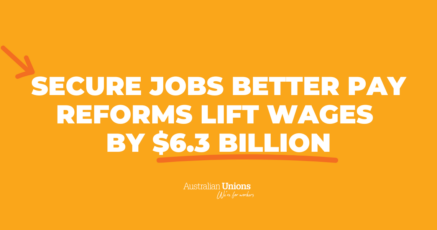We’re all feeling the rising costs of living in one way or another, with electricity bills, petrol prices and groceries chewing up our pay cheques week after week.
CEOs and conservative economists alike keep telling us that the cost of wages is what’s driving inflation. But a recent report from the Australia Institute debunks this myth – revealing that wage costs account for only about 15 percent of overall inflation over the past 3 years, while increases in profits are responsible for 60 percent of inflation.
How profits are driving inflation
Corporate profiteering is elephant in the room when it comes to cost increases. However, CEOs use global supply chain issues as an excuse so they can jack up prices – rather than absorb costs – to increase their own profits. We can’t afford to sweep profiteering under the rug while workers are told, once again, that their wages should decrease for the “health of our economy”.
Ross Gittens points out in this recent article in The Age that the price of goods – not services – accounts for around 80 per cent of price increases over the last year. What’s more, goods only make up 20 per cent of overall production and employment. With this in mind, how can we truly believe that wages are the real economic burden here? It just doesn’t add up.
“But whenever inflation worsens, the economists’ accusing fingers point not to business but to the workers. No one ever says businesses should show more restraint, they do say the only way to fix the problem is for workers to take a real-wage haircut,” Gittens writes.
Basically, supply issues serve as a perfect pretext for big firms with market power to drive up prices where they don’t necessarily need to, amplifying inflation overall. Consumers pay more, corporations cash in, CEOs get their bonuses, and workers’ wages are blamed.
The gaping wound of profiteering will continue to burn a hole in our pockets for as long as CEOs are allowed to continue on this path, unchecked, for their own personal gain at the expense of their employees’ and our community. It’s just another slap in the face when workers are told, as consumers, to accept these costs on a wage that isn’t enough to cover them.
Workers come together to stand against profiteering
Knowing the truth of the matter is one thing; taking action is another. And that’s exactly what the union movement is doing – sending the message that enough is enough: we won’t accept being the sacrificial lamb for corporate profiteering.
Workers in unions continue to stand together because we know using our collective power is the most effective way for all of us to move forward.
How do we know collective action works? Workers in unions have taken on big business – like Qantas, Amazon, Country Road and Esso – and won.
This is what we do day in, day out. While corporate giants rake in the profits that cause inflation to soar, union members are standing up to ensure no worker is left behind.
Being part of a union gives you collective bargaining power. That means working with union representatives who can help you negotiate better terms and conditions, like increased pay and improved leave entitlements.
From community and service workers to technicians and trades, workers in unions continue to negotiate higher pay in ways that ensure all members get a fair wage.







SHARE:
Big business cash in so workers bear the brunt of inflation